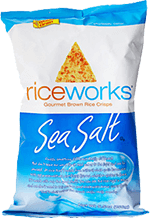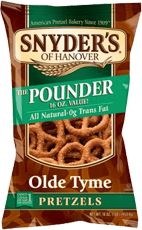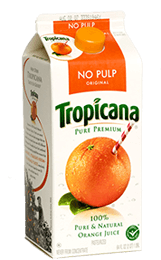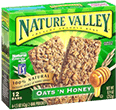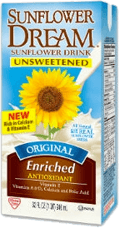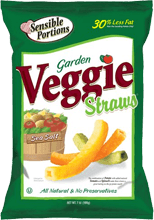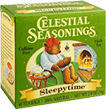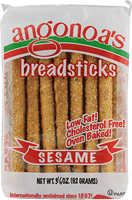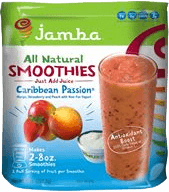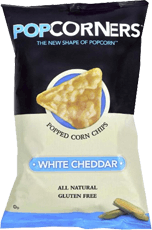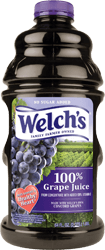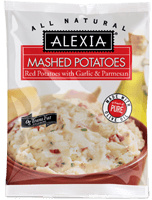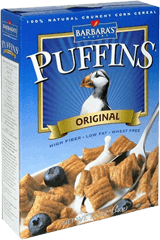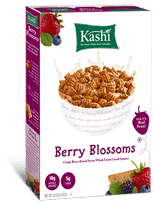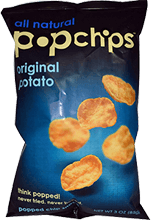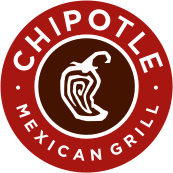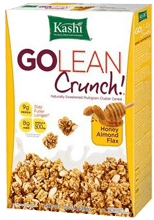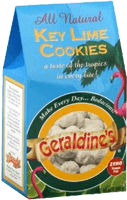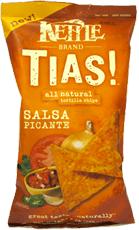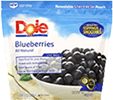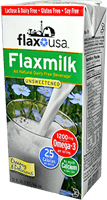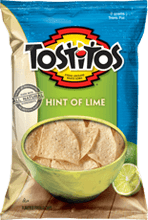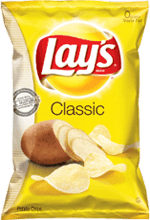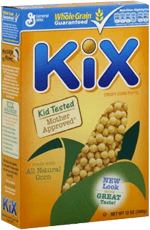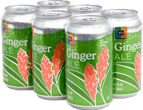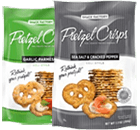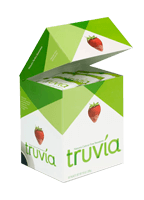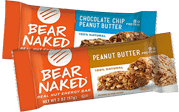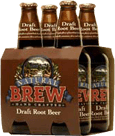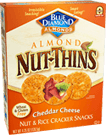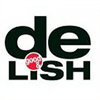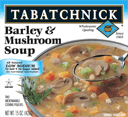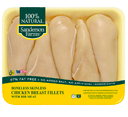Riceworks Gourmet Brown Rice Crisps
Shearer’s Foods
Case Status: DISMISSED Unnatural ingredient(s): Masa Corn Flour, Canola Oil, Maltodextrin
Why are Riceworks brown rice crisps more expensive than potato chips? The company’s Frequently Asked Questions (FAQ) page used to tell customers it was because the crisps "are made with care using high quality, natural ingredients to ensure you are eating an altogether healthier snack than potato chips." Sounds convincing enough, but is it true? A class action lawsuit asked this very question, and the company has since removed the response from its website. With ingredients such as masa corn flour, canola oil, and maltodextrin, which are allegedly synthetic or treated, these snacks should not be advertised as "natural," according to the class action.
In May 2015, the judge overseeing the lawsuit dismissed the case with prejudice.
Bohlke v. Shearer’s Foods, LLC 9:14-cv-80727, U.S. District Court for the Southern District of Florida Simply Orange and Simply Grapefruit Beverages
Simply Orange Juice Company
Case Status: Active Simply Orange Juice Company is facing legal action claiming that the "100% pure-squeezed" claims on its orange and grapefruit juices, as well as the "all natural" claim on its grapefruit juice, are misleading because the beverages are actually highly processed. While the company’s website says its orange juice is made through a "gentle" pasteurization process that allows "oranges to be oranges," it has been alleged that after squeezing the oranges, the manufacturer processes the juices through a method known as de-aeration. This process removes naturally occurring oxygen and, as a result, Simply Orange must restore lost flavor with artificial ingredients, according to the lawsuits.
In re: Simply Orange Orange Juice Marketing and Sales Practices Litigation MDL 2361, U.S. District Court for the Western District of Missouri Crisco Cooking Oils
J.M. Smucker Co.
Case Status: DISMISSED Unnatural ingredient(s): GMO Corn, Soy and/or Canola
Can a food containing GMOs be considered "natural?" That’s what a consumer in California is asking of Crisco’s "all natural" cooking oils, which are allegedly made using GMOs. The label for Crisco's Natural Blend Oil, for example, lists three ingredients: canola, sunflower and soybean oil. The plaintiff alleges that since two of the world’s major GM crops are canola and soy, it’s very likely that these products consist of genetically altered oils. Other products named in the suit include Crisco's Pure Corn Oil, Pure Canola Oil and Pure Vegetable Oil.
The case was dismissed with prejudice in December 2015.
Parker v. J.M. Smucker Co. 3:13-cv-00690, U.S. District Court for the Northern District of California Snyder’s of Hanover Pretzels and Tortilla Chips
Snyder’s-Lance, Inc.
Case Status: Active Unnatural ingredient(s): GMO Corn, GMO Soy, GMO Canola Oil, Maltodextrin, and Disodium Phosphate, among others
Several shoppers in New York, California and Florida who purchased Snyder’s-Lance "all natural" pretzels, potato chips and tortilla chips were unhappy to find that their favorite snacks may contain numerous unnatural ingredients. In fact, three dozen of the company’s snacks contain GMOs and many of the snacks contain artificial, synthetic and/or highly processed ingredients, according to the lawsuit. The plaintiffs claim that these ingredients – including canola oil, soybean oil, enriched flour, niacin, thiamine mononitrate, folic acid, yellow corn or white enriched corn, maltodextrin, dextrose, disodium phosphate and artificial colors – are not at all "natural," and that Snyder’s preys on consumers’ interests in purchasing healthy, simple foods.
Barron et al v. Snyder’s-Lance, Inc. 0:13-cv-62496, U.S. District Court for the Southern District of Florida Tropicana Orange Juice
Tropicana Products, Inc.
Case Status: Active On the front of a Tropicana orange juice bottle, there’s an illustration of an orange with a straw stuck inside, as well as claims that the beverage is "not from concentrate" and "100% pure and natural." While the overall image Tropicana has created for its juice may seem "natural," a class action lawsuit alleges that the beverage is no different than others that are made from concentrate. According to the complaint, Tropicana’s orange juice loses important nutrients, flavors and aromas when it undergoes de-aeration (removal of naturally occurring oxygen) and pasteurization (heating to remove bacteria). In fact, the plaintiff alleges that these processes allow Tropicana to store their juice for up to a year before shipping it out to food stores across the country. But before Tropicana ships its juice out, the company adds chemically engineered "flavor packs" to the beverages to reinstate the missing fresh-juice flavor, according to the suit.
Lynch v. Tropicana Products, Inc. 2:11-cv-07382, U.S. District Court for the District of New Jersey Nature Valley Granola Thins and Granola Bars
General Mills
Case Status: Settled Unnatural ingredient(s): Maltodextrin, High Fructose Corn Syrup, High Maltose Corn Syrup, Soy Flour, Soy Lecithin, GMO Yellow Corn Flour
On the website for its Nature Valley brand, General Mills advertises that "no matter how many flavors we create, you can be assured that with Nature Valley, you’re always getting the taste nature intended." Well, some people were not so sure. Four class action lawsuits – three filed in California and one in Colorado – accused General Mills of falsely advertising more than 30 of its Chewy Trail Mix Granola Bars, Sweet & Salty Nut Granola Bars, Granola Thins and Yogurt Bars as “100% natural.” The plaintiffs claimed these bars shouldn’t be labeled “natural” because they contain highly processed ingredients and genetically modified organisms (GMOs).
In November 2014, General Mills agreed to settle these class actions. Under the agreement, General Mills will remove the “100% natural” labels from granola bars that contain more than 0.9 percent GMOs. Furthermore, the company agreed to drop the “natural” labeling from products containing any of the following synthetic or artificial ingredients: calcium carbonate, corn syrup, dextrose monohydrate, glycerin, high fructose corn syrup (HFCS), high maltose corn syrup (HMCS), maltodextrin, sodium bicarbonate, soy lecithin, soy protein isolate and tocopherols.
Janney et al. v. General Mills 3:12-cv-03919, U.S. District Court for the Northern District of California Rojas v. General Mills, Inc. 3:12-cv-05099, U.S. District Court for the Northern District of California Bohac v. General Mills, Inc. 3:12-cv-05280, U.S. District Court for the Northern District of California Van Atta v. General Mills, Inc. 1:12-cv-02815, U.S. District Court for the District of Colorado "Dream" Drink Products
The Hain Celestial Group, Inc.
Case Status: Active Unnatural ingredient(s): Tricalcium Phosphate, Xanthan Gum, Vitamin A Palmitate, Folic Acid, Vitamin D2
The Hain Celestial Group, Inc. is facing a class action lawsuit alleging that it "unlawfully misbranded and falsely, misleadingly and deceptively" advertised its Sunflower Dream Sunflower Drink Unsweetened (Original) product as "all natural." The suit claims the drink should have never been marketed as "all natural" because the product contains several artificial or synthetic ingredients, including tricalcium phosphate, xanthan gum, vitamin A palmitate, folic acid and vitamin D2. Furthermore, the suit claims that consumers may have been led to believe the products contain "juice" because "evaporated cane juice" – just another term for sugar – is listed on the products’ ingredient lists.
Anderson v. The Hain Celestial Group, Inc. et al 5:14-cv-03895, U.S. District Court for the Northern District of California Earth’s Best Products
The Hain Celestial Group, Inc.
Case Status: Active Unnatural ingredient(s): Zinc Sulfate, Taurine, Calcium Pantothenate, and Choline Chloride, among others
As a leading maker of organic and natural baby products, The Hain Celestial Group, Inc. has come under fire for marketing and selling products that allegedly don’t live up to their advertised claims. According to a suit filed in New York, the company falsely and misleadingly labeled its "Earth’s Best" brand of infant and baby foods, baby care products and home care products as "all natural" and "organic." The suit claims the products contain a "spectacular array of ingredients" that federal law does not allow to be used in organic foods, that are synthetic, or that the company promised to never put in its products.
For instance, the suit claims that the company’s Earth’s Best "Organic" Infant Formula with DHA and ARA contains a laundry list of ingredients that are not permitted in organic foods: adenosine-5'-monophosphate, cytidine-5'-monophosphate, disodium guanosine-5'-monophosphate, disodium inosine-5'-monophosphate, disodium uridine-5'-monophosphate, docosahexaenoic acid, arachidonic acid, cupric sulfate, manganese sulfate, potassium bicarbonate, sodium selenite (a very toxic and hazardous substance), zinc sulfate, taurine, ascorbyl palmitate, calcium pantothenate, choline chloride, inositol, pyridoxine hydrochloride, thiamin hydrochloride, retinyl palmitate, cholecalciferol, dl-alpha tocopheryl acetate, and phytonadione. Other products named in the suit include infant puree pouches, Yummy Tummy instant oatmeal, frozen mini waffles, and Sesame Street meals, which include Elmo soup and cheese ravioli.
Segedie et al v. The Hain Celestial Group, Inc. et al 7:14-cv-05029, U.S. District Court for the Southern District of New York Sensible Portions Garden Veggie Straws
The Hain Celestial Group, Inc.
Case Status: Active Unnatural ingredient(s): Beetroot Powder
There’s no shortage of "natural" lawsuits filed against health food mainstay The Hain Celestial Group, Inc. This one alleges that the company’s garden veggie straws contain chemical preservatives and artificial ingredients, coloring and flavorings despite being advertised as "natural." The suit also claims that The Hain Celestial Group, Inc. advertises its Terra chips as having "no trans fats," but contain total fat levels that, according to FDA guidelines, may be harmful to one's health. The lawsuit further claims that listing "evaporated cane juice" as an ingredient in its coconut drink products is misleading, as this is just another term for sugar.
Smedt v. The Hain Celestial Group, Inc. 5:12-cv-03029, U.S. District Court for the Northern District of California Celestial Seasonings Tea
The Hain Celestial Group, Inc.
Case Status: Active Unnatural ingredient(s): Buprofezin, Carbendazim, Chlorpyrifos-Ethyl, Dimethoate, and Hexaflumuron, among others
You’d never think your "100% natural" tea would contain pesticides, carcinogens or developmental toxins. But litigation involving Celestial Seasonings’ teas is alleging just that. The lawsuits name the brand’s Sleepytime Herbal Tea, Sleepytime Kids Goodnight Grape, Green Tea Peach Blossom, Green Tea Raspberry Gardens, Authentic Green Tea, Antioxidant Max Dragon Fruit, Green Tea Honey Lemon Ginseng, Antioxidant Max Blackberry Pomegranate, Antioxidant Max Blood Orange, and English Breakfast Black KCup among the allegedly unnatural teas. The ingredients at issue in this litigation include carbendazim (a fungicide used in paints, adhesives and textiles), hexaflumuron (a chemical pesticide used for termite control) and triazophos (a chemical pesticide that caused cognitive dysfunction in rats in controlled studies), among others.
In re: Hain Celestial Seasonings Products Consumer Litigation 8:13-cv-01757, U.S. District Court for the Central District of California Breadsticks
JAG Specialty Foods, LLC
Case Status: Private Settlement Unnatural ingredient(s): Corn Syrup, Soybean Oil
In January 2015, JAG Specialty Foods agreed to settle a lawsuit alleging that the company deceptively marketed its breadsticks as “all natural.” According to the suit, the breadsticks contain corn syrup, soybean oil and other artificial ingredients that undergo “several distinct chemical processes,” such as alkaline neutralization, bleaching, deodorizing and conditioning. The plaintiff alleged that the ingredients in the breadsticks are not “natural” and, as a result, JAG Specialty Foods misled consumers and wrongfully charged a premium for its mislabeled products. The suit specifically named the following breadstick flavors as misbranded: plain, garlic, sesame, fat free, onion, whole wheat and everything.
The lawsuit, however, was never certified as a class action, and the settlement – which was reached out of court and the terms of which remain private – only benefited the named plaintiff. Therefore, it is unclear whether the settlement included any label updates. Depending on whether JAG Specialty Foods removed the “all natural” label from its breadsticks, consumers may or may not be able to bring additional lawsuits against the food manufacturer in the future.
Monka v. JAG Specialty Foods, LLC 9:14-cv-80764, U.S. District Court for the Southern District of Florida At-Home Smoothie Kits
Jamba Juice Company and Inventure Foods, Inc.
Case Status: Settled Unnatural ingredient(s): Ascorbic Acid, Citric Acid, Xanthan Gum, Steviol Glycosides, Gelatin, Modified Corn Starch
In December 2014, Jamba Juice agreed to settle a class action lawsuit that alleged the company’s at-home smoothie kits are not “all natural,” despite their advertised claims. The lawsuit alleged that the smoothie kits, which are available in five flavors (Mango-a-go-go, Strawberries Wild, Caribbean Passion, Orange Dream Machine and Razzmatazz), contain unnatural, processed and synthetic ingredients. The plaintiffs named the following ingredients as those that could not be considered natural: ascorbic acid (a commercially produced food additive), citric acid (a commodity chemical produced by mycological fermentation), xanthan gum (a polysaccharide derived from a bacterium), steviol glycosides (a sweetener extracted from stevia plants), and gelatin (an ingredient made from boiled skin and cartilage from animals).
Beginning in March 2015, Jamba Juice will remove the “all natural” labels from its at-home smoothie kits that contain the ingredients in question. Under the settlement, the company agreed that these label changes will remain implemented unless the FDA issues a binding guidance that allows these ingredients to be described as “natural.” While the settlement will not provide compensation to those who purchased the allegedly mislabeled products, it does allow consumers to seek damages in the future.
Lilly et al v. Jamba Juice Company and Inventure Foods, Inc., f/k/a The Inventure Group, Inc. 3:13-cv-02998, U.S. District Court for the Northern District of California Crystal Light, Mexican Four Style Cheese, Capri Sun, and Back to Nature Granola and Graham Crackers
Kraft Foods Global, Inc., Cadbury Adams USA LLC and Back to Nature Foods Company
Case Status: Active Unnatural ingredient(s): Maltodextrin, Alpha Tocopherol Acetate, and Butylated Hydroxyanisole, among others
A class action lawsuit is accusing Kraft Foods and others of falsely marketing and advertising some of their products as "natural." The suit claims that Kraft’s Mexican Four Style Cheese contains unnatural and synthetic ingredients, including cellulose powder, calcium sulfate, annatto color and vitamin A palmitate despite being labeled as "natural." Crystal Light products also came under fire for containing aspartame, butylated hydroxyanisole (BHT), yellow no. 5 and maltodextrin, among other ingredients. The suit also claimed that Capri Sun Fruit Punch and Back to Nature Classic Granola and Golden Honey Oat Graham Crackers were advertised as having no preservatives despite the fact that both contained the common food preservative Alpha Tocopherol Acetate.
Ivie v. Kraft Foods Global, Inc. et al 5:12-cv-02554, U.S. District Court for the Northern District of California Corn Bread Mix, Muffin Mix and Biscuit Mix
Marie Callender’s and Conagra
Case Status: Active Unnatural ingredient(s): Sodium Acid Pyrophosphate
Is Marie Callender’s falsely advertising its products as "all natural"? That’s what a class action filed in California is saying. According to the suit, various biscuit, muffin and corn bread mixes sold under the Marie Callender’s brand contain the synthetic substance sodium acid pyrophosphate. This substance is an odorless white powder that is allegedly used to remove iron stains on hides during leather treatment and to help remove hair and feathers from pigs and birds that are slaughtered for their meat. Sodium acid pyrophosphate is also used in petroleum products and, according to the suit, can lead to "imbalanced levels of minerals in the body and bone loss" when used excessively. Products named in the suit are Marie Callender’s Original Corn Bread Mix, Corn Bread Muffin Mix, All-Purpose Biscuit Mix, Sweet Potato Muffin Mix, Honey Butter Corn Bread and Muffin Mix, and Multigrain Muffin Mix.
Musgrave v. Marie Callender's Pie Shops, Inc. et al 3:14-cv-02006, U.S. District Court for the Northern District of California Popcorners Popped Corn Chips
Medora Holdings, LLC
Case Status: DISMISSED Unnatural ingredient(s): GMO Plants
This class action claims Popcorners Popped Corn Chips, available in a variety of flavors, are not "all natural," despite what their packaging says. The suit alleges that the products contain unnatural, genetically modified plants and accuses Medora Holdings of making false, misleading and deceptive claims to entice consumers into purchasing their chips. These products are sold in the following flavors: butter, white cheddar, kettle, cheesy jalapeno, sea salt, and caramel.
The case was dismissed with prejudice in September 2015.
Nguyen v. Medora Holdings, LLC 5:14-cv-00618, U.S. District Court for the Northern District of California Welch’s Juice, Jams and Jellies
Welch Foods, Inc.
Case Status: Active Unnatural ingredient(s): Sodium Citrate, Citric Acid, Ascorbic Acid, Potassium Metabisulfite
Did Welch Foods, Inc. mislead consumers into thinking its juices and spreads were "healthier" than rival products? That’s what a lawsuit filed in California is saying. Allegedly, Welch advertises that its 100% grape and white cherry grape juices are "free from artificial flavors or preservatives" despite the fact that these juices contain ascorbic acid and citric acid. The suit also makes similar claims against some of Welch’s jams and jellies advertised as "natural" and free from artificial flavors, colors or preservatives.
Park et al. v. Welch Foods Inc. 5:12-cv-06449, U.S. District Court for the Northern District of California Frozen Potato Products
Alexia Foods, Inc., a unit of ConAgra Foods, Inc.
Case Status: Settled Unnatural ingredient(s): Disodium Dihydrogen Pyrophosphate
This case, now settled, accused Alexia Foods, Inc. of misleading consumers in selling its mashed potato products. The company advertised the products as “all natural” in both print and television commercials; however, the suit claimed the company’s Sauté Reds, Mashed Potatoes Yukon Gold Potatoes & Sea Salt, and Mashed Potatoes Red Potatoes with Garlic & Parmesan, among others, actually contain a chemical preservative known as disodium dihydrogen pyrophosphate. This preservative is an odorless white crystalline powder that, according to the suit, “is used in the leather industry to remove iron stains on hides during processing” and “to remove hair in hog slaughter and feathers in poultry slaughter.” Federal laws specifically exclude synthetic chemicals from being used in products carrying the “natural” label, according to the suit. Under the terms of the settlement, ConAgra agreed to use another naturally sourced compound in place of disodium dihydrogen pyrophosphate.
Vicuna et al. v. Alexia Foods, Inc. 4:11-cv-06119, U.S. District Court for the Northern District of California High Meadow Milk and Milk Products
Aurora Dairy Corp.
Case Status: Settled Aurora was accused of advertising milk and milk products sold under its High Meadow brand as "organic" despite the fact the products failed to meet requirements set out by the Organic Foods Production Act, 1990. Specifically, the company failed to use pastures considered adequate enough to minimize the spread of disease and failed to keep accurate records to back up its "organic" claims, according to the allegations. Products named in the litigation were sold under Aurora’s "High Meadow" brand, Costco’s "Kirkland" brand, Safeway’s "O Organics" brand, Target’s "Archer Farms" brand, Wal-Mart’s "Great Value" brand and Wild Oats’ store brand. The litigation is now settled.
In re: Aurora Dairy Corp. Organic Milk Marketing and Sales Practices Litigation MDL 1907, U.S. District Court for the Eastern District of Missouri Puffins Cereal
Weetabix, Barbara’s Bakery
Case Status: Settled Unnatural ingredient(s): GMO Plants
Barbara’s Bakery, Inc. is a subsidiary of Weetabix North America. In 2012, a lawsuit was filed accusing the company of promoting its corn-based Puffins cereal (available in Original, Multigrain, Peanut Butter, Peanut Butter and Chocolate, Crunchy Cocoa, Fruit Medley and Cinnamon varieties) as "all natural" despite the fact that the products contained GMO plants. As GMO plants are not natural, the suit argued, it was misleading to advertise the cereal as "all natural." The case settled in 2013.
Trammell v. Barbara's Bakery, Inc. 3:12-cv-02664, U.S. District Court for the Northern District of California Granola Bars, Granola, Trail Mix and Cookies
Bear Naked, Inc.
Case Status: Settled Unnatural ingredient(s): Cocoa Processed with Alkali, Glycerin, Lecithin
In 2011, Bear Naked, Inc. was hit with a suit over its granolas, granola bars, trail mixes and cookies. Consumers claimed that the products, advertised as "100% pure and natural," contained potassium carbonate, glycerin and lecithin – all of which are classified as synthetic chemicals by federal regulators. Under the terms of the settlement, Bear Naked, Inc. agreed to remove "100% Natural" and "100% Pure and Natural" from the products’ labels and advertisements.
Thurston et al v. Bear Naked, Inc. 3:11-cv-02890, U.S. District Court for the Southern District of California Various (shakes, cereals, cookies, granola bars, etc.)
Kashi
Case Status: Settled Unnatural ingredient(s): Ascorbic Acid, Calcium Pantothenate, Calcium Phosphate, and Glycerin, among others
Kashi Co. labeled several of its food products as "all natural" and claimed they contained "nothing artificial." A class action lawsuit challenged these claims, however, and alleged that the company regularly added processed or synthetic ingredients. The suit named Kashi’s GoLean Shakes, granola bars, crackers, cookies and breakfast cereals, among others, which were advertised as all natural and yet were allegedly composed almost entirely of synthetic and unnaturally processed ingredients. According to the suit, these ingredients included ascorbic acid, calcium pantothenate, calcium phosphates, glycerin, hexane-processed soy ingredients, potassium bicarbonate, potassium carbonate (a/k/a Cocoa processed with Alkali), pyridoxine hydrochloride, sodium acid pyrophosphate, sodium citrate, sodium phosphates, tocopherols, and xanthan gum. Other products named in the suit include the company's protein and fiber bars, pizza, pita crisps and trail mix.
Astiana et al v. Kashi Company et al 3:11-cv-01967, U.S. District Court for the Southern District of California Naked Juice Drinks
Naked Juice Co.
Case Status: Settled Unnatural ingredient(s): GMO crops, Ascorbic Acid, Beta Carotene, Biotin, Choline Bitartrate, and Inulin, among others
Naked Juice drinks are clearly targeted at health-conscious consumers and often tout "all natural" and "non-GMO" claims. The company that makes these drinks, however, was accused of adding synthetic ingredients and ingredients derived from GM crops to its juices. The suit argued that it was reasonable to assume the juice had only natural ingredients since it made repeated statements about being "100% pure." A quick look at the ingredients list, however, shows potassium carbonate, glycerin and lecithin – all artificial chemicals, according to the lawsuit. Drinks named in the suit included Acai Machine, Berry Veggie, Blue Machine, Gold Machine, Green Machine, Mango Veggie, Mighty Mango, Pomegranate Acai, Power C Machine, Protein Zone, Protein Zone Double Berry, Protein Zone Mango, and Red Machine.
Pappas et al v. Naked Juice Co. 11-cv-08276, U.S. District Court for the Central District of California Popchips
PopChips, Inc.
Case Status: Settled Unnatural ingredient(s): Autolyzed Yeast Extract, Dextrose, Maltodextrin, and Disodium Phosphate, among others
This lawsuit alleged that Popchips misleadingly labeled its products as "all natural," "healthy," and "healthier" despite the fact they contained highly processed artificial and synthetic ingredients, including GMOs. It’s a shame – the company has managed to carve out a successful niche by producing snacks that avoid frying and baking, and thus a lot of calories. Still, it couldn’t sidestep its alleged misuse of the term "natural." As part of the settlement, the company agreed to change Popchips labels to read "naturally delicious" and containing "natural flavors" and to modify the product’s non-GMO claims.
Kelly et al. v. PopChips, Inc. 1316-cv-11037, Circuit Court Jackson County Missouri at Kansas City Various (cookies, biscuits, cinnamon rolls, etc.)
Trader Joe's
Case Status: Settled Unnatural ingredient(s): Ascorbic Acid, Cocoa Processed with Alkali, and Sodium Acid Pyrophosphate, among others
Trader Joe’s use of "all natural" and "100% natural" was challenged in 2011 when consumers claimed that several of the grocer’s products contained ascorbic acid, potassium carbonate, sodium acid pyrophosphate, sodium citrate, xanthan gum, and/or vegetable monoglycerides and diglycerides. According to the suit, these are all recognized by federal regulators as synthetic chemicals. Products named in the case include Joe-Joe’s Chocolate Vanilla Crème Cookies, Joe-Joe’s Chocolate Sandwich Crème Cookies, Trader Joe’s Jumbo Cinnamon Rolls, Trader Joe’s Buttermilk Biscuits, Trader Joe’s Fresh Pressed Apple Juice, Trader Giotto's 100% Natural Fat Free Ricotta Cheese, and Trader Joe’s Fruit Jellies, among others.
Larsen et al v. Trader Joe's Company 3:11-cv-05188, U.S. District Court for the Northern District of California Healthy Choice Pasta Sauce
ConAgra Foods, LLC
Case Status: Settled Unnatural ingredient(s): High Fructose Corn Syrup
ConAgra faced a lawsuit in 2008 over its use of "deliciously all natural" and "a 100% natural sauce" on the packaging of its Healthy Choice pasta sauces. The suit alleged that the products were not natural because they contained high fructose corn syrup. ConAgra attempted to have the case dismissed, but the move was denied by the judge. The parties eventually reached an undisclosed settlement agreement.
Lockwood v. ConAgra Foods Inc. 3:08-cv-04151, U.S. District Court for the Northern District of California "Naturally" Raised Meat
Chipotle Mexican Grill, Inc.
Case Status: Resolved in Favor of Defendant In June 2014, the Honorable Judge Dale S. Fischer entered a judgment in favor of Chipotle in a putative class action lawsuit that alleged the fast-casual restaurant falsely advertised the meat in its food as being “naturally raised.” In the lawsuit, the plaintiff alleged that Chipotle took part in an advertising campaign that misled the public about the meat used in its meals because many of the restaurant’s locations used conventionally raised meat during 2011 and 2012 due to supply issues.
The judgment came just a few months after Judge Fischer refused to grant class certification in the lawsuit, citing problems with being able to discern potential claimants. In his December 2013 order, Judge Fischer found that potential claimants would need to undergo individual investigations to determine the dates and restaurant locations where they ate, as well as the type of meat they purchased, which would render the class action method inefficient. Judge Fischer also pointed out that any potential settlement reached in the case would be unlikely to fairly compensate affected customers because many would simply not bother to file a claim over the relatively small purchase.
Hernandez v. Chipotle Mexican Grill, Inc. et al 2:12-cv-05543, U.S. District Court for the Central District of California Skinnygirl Margarita
Beam Global Spirits & Wine, Inc.
Case Status: DISMISSED Unnatural ingredient(s): Sodium Benzoate
Beam distributes and sells Skinnygirl margarita drinks with labels that read "all natural," "uses all natural ingredients," and "contains no preservatives." A class action lawsuit filed in 2011, however, claims the company had no justification for using these phrases because the drinks were not natural at all. In fact, the suit points out that the drink contains sodium benzoate, a potential carcinogen. The suit also notes that Whole Foods had pulled the drinks from its shelves specifically because they failed to live up to their natural claims.
In June 2015, the judge dismissed this case with prejudice.
Stewart et al v. Beam Global Spirits & Wine, Inc. et al 1:11-cv-05149, U.S. District Court for the District of New Jersey Geraldine's Cookies
Bodacious Food Company
Case Status: DISMISSED Unnatural ingredient(s): Sugar, Canola Oil, Dextrose, Corn Starch, Citric Acid
A class action lawsuit filed against Bodacious foods alleged that the company’s Geraldine’s Cookies are not “all natural” because they contain artificial and genetically modified ingredients. According to the complaint, the following unnatural ingredients are found in various Geraldine’s Cookies: sugar, canola oil, dextrose, corn starch and citric acid. The lawsuit alleged that the “natural” labels on Geraldine’s Italian Wedding Cookies, Geraldine’s Pecan Cini-Minis Cookies and Geraldine’s Key Lime Cookies violated both Florida and federal consumer protection laws.
In March 2015, the plaintiff and defendants agreed that the action should be dismissed with prejudice and the judge overseeing the case granted their joint request; however, it was not disclosed whether the parties reached any type of settlement regarding the allegations contained in the lawsuit or if the case was dismissed for other reasons.
Dye v. Bodacious Food Company 9:14-cv-80627, U.S. District Court for the Southern District of Florida Stevia in the Raw
Cumberland Packing Corp.
Case Status: SETTLED Unnatural ingredient(s): Dextrose, Maltodextrin
Stevia in the Raw is advertised as all natural – but, one lawsuit is claiming the exact opposite. Despite a label reading "100% Natural Zero Calorie Sweetener," the product allegedly contains dextrose and maltodextrin. According to the lawsuit, these are both highly processed and unnatural ingredients made by chemically converting GM corn into a food-grade starch, which is then mixed with enzymes. The suit accuses Cumberland Packing Corp. of fraud and making misleading claims.
This case was settled in April 2016.
Frohberg et al v. Cumberland Packing Corp. 1:14-cv-00748, U.S. District Court for the Eastern District of New York Vegetables, Canned Tomatoes, and Fruit Naturals
Del Monte Corporation
Case Status: DISMISSED Unnatural ingredient(s): Citric Acid, Calcium Chloride, Ascorbic Acid, and Potassium Sorbate, among others
Del Monte has been accused of mislabeling its foods and deceiving consumers by using phrases such as "fresh" and "natural" on its FreshCut vegetable products and Fruit Naturals products. This lawsuit also alleges that the company’s health claims – i.e., that the food’s antioxidant levels can aid health or that lycopene, found in its canned tomatoes, has certain benefits – are unsubstantiated and may even violate FDA regulations for the introduction of new "drugs." The argument is based on Del Monte’s claims (on its website and in other places) that lycopene is effective for therapeutic use. The products may also contain preservatives, once again bringing into question the "natural" claims.
The case was dismissed with prejudice in September 2015.
Kosta v. Del Monte Corporation 4:12-cv-01722, U.S. District Court for Northern District of California Various Kettle Brand TIAS Tortilla Chips
Diamond Packaged Foods, Inc.
Case Status: Settled Unnatural ingredient(s): Maltodextrin, Dextrose
In October 2014, Diamond Foods agreed to settle a class action lawsuit that alleged the “all natural” labeling on its Kettle Brand Tias! Chips is false and misleading. According to the lawsuit, various Tias! Tortilla Chips contain the artificial and processed ingredients maltodextrin and dextrose. The plaintiff alleged that these ingredients rendered the chips unnatural and accused Diamond Foods of fraudulent and unlawful advertising practices.
Specifically, the suit named Kettle brand Nacho Cheddar Tortilla Chips, Zesty Ranch Tortilla Chips, Salsa Picante Tortilla Chips, Sweet Baja Barbeque Tortilla Chips, and Chili Con Queso Tortilla Chips among the allegedly unnatural products.
Under the settlement, Diamond Foods will pay $2,750,000 to compensate anyone who purchased the company’s Tias! Tortilla Chips since January 3, 2010.
Klacko v. Diamond Foods, Inc. 9:14-cv-80005, U.S. District Court for the Southern District of Florida Ghirardelli White Chocolate Products
Ghirardelli Chocolate Company
Case Status: Settled In 2012, two consumers filed a putative class action lawsuit against Ghirardelli after purchasing the company's "Chocolate Premium Baking Chips – Classic White" and finding that the chips tasted – and smelled – nothing like white chocolate. Several of the company's products, including its Chocolate White Flavored Confectionary Coating Wafers and Chocolate Premium Hot Beverages – White Mocha, are advertised as containing natural white chocolate; however, the plaintiffs claimed that these products do not contain white chocolate – or any chocolate, for that matter. Rather, they are made using chocolate-like artificial flavors, according to the suit. While white chocolate must contain a minimum of 20 percent cocoa butter under the FDA's requirements, the plaintiffs alleged that some of Ghirardelli's white chocolate products didn't contain any cocoa butter. For this reason, the plaintiffs claimed that Ghirardelli misled consumers about the contents of its products and consumers were tricked into paying a premium for the company's "fake white chocolate" products.
Ghirardelli agreed to settle these claims in August 2014 and, under the agreement, the company is restricted from labeling certain products as "white chocolate" and can no longer label products that contain artificial flavors as "all natural."
Miller et al. v. Ghirardelli Chocolate Company 3:12-cv-04936, U.S. District Court for the Northern District of California Various (cupcakes, cookies, mini muffins, etc.)
Whole Foods Market, Inc.
Case Status: DISMISSED Unnatural ingredient(s): Maltodextrin, Sodium Acid Pyrophosphate
Whole Foods prides itself on selling good, quality food, but one lawsuit claims the company falsely and dishonestly advertises certain baked goods as "all natural" when they actually contain synthetic ingredients. The suit names the company’s all natural mini muffins (banana bran, blueberry and coffee cake flavors), all natural cookies (chocolate chip, oatmeal raisin and snickerdoodle), all natural gluten-free cupcakes (chocolate and vanilla), and other all natural gluten-free products, including apple pie, cheddar biscuits, corn bread and molasses ginger cookies. According to the lawsuit, these products contain sodium acid pyrophosphate and other synthetic ingredients, such as maltodextrin.
In June 2016, this case was resolved by way of "settlement conference" and the case was dismissed without prejudice.
Garrison et al. v. Whole Foods Market Inc. 3:13-cv-05222, U.S. District for the Northern District of California Blue Diamond Almond Breeze Almond Milk
Whole Foods is facing a separate class action that alleges it mislabeled certain products as free from genetically modified organisms (GMOs). In Richard v. Whole Foods Market California, the plaintiff alleges that certain Blue Diamond Almond Breeze almond milk beverages bore the “Non-GMO Project Verified” label, which suggests that the non-profit organization evaluated these drinks and did find any GMOs. The plaintiff alleges that these almond milk beverages were never verified by the Non-GMO Project and that Whole Foods preyed on consumers’ willingness to pay a premium for items with these labels.
This case was dismissed without prejudice in February 2017.
Richard v. Whole Foods Market California BC563304, Superior Court of the State of California, for the County of Los Angeles "All Natural" Dole Canned and Cupped Fruit Products
Dole
Case Status: Dismissed Unnatural ingredient(s): Citric Acid, Ascorbic Acid
A class action filed against Dole alleges that the company’s canned and cupped fruit products should not be labeled and advertised as "all natural" because they contain citric acid and ascorbic acid. According to the class action, Dole is in violation of Arkansas consumer protection laws that prohibit companies from selling food that is "misbranded." Under Arkansas law, a food product is misbranded if "its labeling is false or misleading in any particular way." Products named in the suit include: Dole Tropical Fruit, Dole Mixed Fruit, Dole Diced Peaches, Dole Mandarin Oranges, Diced Apples, Diced Pears, Pineapple Tidbits, and Red Grapefruit Sunrise. This case was dismissed with prejudice in September 2015.
Kinney v. Dole Packaged Foods, LLC 5:14-cv-05182, U.S. District Court for the Western District of Arkansas Various Dole Fruit Products
Dole
Case Status: Resolved in Favor of Defendant Unnatural ingredient(s): Maltitol, Carrageenan, Maltodextrin, Cochineal Extract, and Locust Bean Gum, among others
In December 2014, Dole was granted summary judgment in a lawsuit that alleged several of the company’s canned, cupped and packaged fruit products labeled “all natural fruit” were misbranded because they contain a host of allegedly synthetic ingredients. According to the lawsuit, at least 10 different Dole products including the company’s Frozen Mixed Fruit and Diced Apples, Peaches and Pears contain the following synthetic ingredients: maltitol, carrageenan, cochineal extract , locust bean gum, natural and artificial flavors, fumaric acid, maltodextrin, sodium citrate, potassium citrate, ascorbic acid, caramel color, sucralose and malic acid. The lawsuit alleged that the “all natural” labels on these products were false and misleading because the ingredients in question are man-made or artificial and that these labels were designed to fraudulently increase sales of Dole’s products.
U.S. District Judge Lucy Koh, who was overseeing the lawsuit, however, sided with Dole and granted the company’s motion for summary judgment. According to Judge Koh, the lawsuit did not provide any evidence for its allegations that the ingredients citric acid and ascorbic acid “would not normally be expected to be in” the products. Furthermore, she found that the plaintiff’s “one isolated example of deception” could not serve as evidence that the “all natural” labels were likely to deceive a majority of consumers.
Brazil v. Dole Food Company, Inc. et al 5:12-cv-01831, U.S. District Court for the Northern District of California Flaxmilk
Flax USA, Inc.
Case Status: Settled Unnatural ingredient(s): Tricalcium Phosphate, Xanthan Gum, Vitamin A Palmitate, Vitamin D2, Vitamin B12
In August 2014, Flax USA agreed to settle a class action lawsuit that alleged the company misled consumers by advertising and labeling its Flaxmilk beverages as “all natural” when they contained numerous synthetic and artificial ingredients. In the lawsuit, the plaintiff pointed out that the size and placement of these unnatural ingredients appear in small print on the side of the products. This is in stark contrast to the conspicuous “all natural” labeling that appears in larger print and in more prominent locations, such as on the front of the Flaxmilk cartons, according to the suit.
While attorneys for Flax USA argued that the use of the term “all natural” is a “generalized, vague and subjective statement” that cannot form the basis of a misleading advertising lawsuit, the company ultimately agreed to settle the lawsuit. Under the agreement, Flax USA agreed to no longer label its products “all natural” and established a $260,000 settlement fund from which consumers can claim between $2.50 and $3.25 for each carton of Flaxmilk they purchased, with a cap of 10 cartons.
Madenlian v. Flax USA, Inc. 8:13-cv-01748, U.S. District Court for the Central District of California Tostitos Tortilla Chips, SunChips, and Frito-Lay Bean Dip
Frito-Lay North America and Pepsico
Case Status: Settled Unnatural ingredient(s): GMO Plants
The litigation alleges that Frito-Lay labels its Tostitos and SunChips products as "made with ALL NATURAL ingredients" despite the fact that these products contain GMOs. According to the case, "all natural" labeling is displayed on the products’ packaging and on Frito-Lay’s website, as well as in advertisements for Tostitos and SunChips. For example, Frito-Lay’s website has a section titled "Naturally Delicious" where it states that, "We’re proud to make so many of the Frito-Lay snacks you love with all natural ingredients. We believe that real flavor comes straight from nature. From farm-fresh tomatoes to fragrant basil to slow-roasted chipotle peppers, we make sure to use the best nature has to offer" and "all Frito-Lay snack chips made with all-natural corn or potatoes and healthier oils." The lawsuits allege that the corn and oils used in Tostitos, SunChips, and Fritos, however, are made from genetically modified plants. The case also notes that pesticide behemoth Monsanto all but admits that GMOs are unnatural in that the company defines its genetically modified products as "plants or animals that have had their genetic makeup altered to exhibit traits that are not naturally theirs." Attorneys for the food companies argued in a motion to dismiss that the plaintiffs are attempting to redefine the word "natural" to exclude "methods of growing crops" using genetically modified seeds.
In October 2017, Frito-Lay agreed to settle the lawsuit. Though class members didn’t receive any money in the settlement, Frito-Lay was barred from marketing and labeling its products as “all natural” if they contained genetically modified ingredients. The deal also ensured that the company would not stamp its products with a “non-GMO” label unless they are certified by an independent organization.
In re: Frito-Lay North American, Inc. "All Natural Litigation" MDL 2413, U.S. District Court for the Eastern District of New York Lay’s Potato Chips, Cheetos Puffs, and Fritos Corn Chips
Frito-Lay and Pepsico
Case Status: Active Unnatural ingredient(s): Caramel Coloring, Maltodextrin, and Citric Acid, among others
This class action lawsuit alleges that Lay’s Potato Chips, Cheetos Puffs, and Fritos Corn Chips are mislabeled and falsely advertised because the companies claim these products: 1) are "all natural" despite containing artificial or unnatural ingredients, flavorings, coloring, and chemical preservatives; 2) have "0 grams Trans Fat" but actually do contain trans fat; 3) have "No MSG" despite containing MSG; and 4) have "low sodium" despite having more than 140 mgs of sodium per serving. The class action alleges that the illegal statements contained on the labels are misleading, deceptive, unfair and fraudulent. As far as claims that the snacks are "all natural," the suit notes that these products contain yeast extract, maltodextrin, caramel color and citric acid. Attorneys for Frito Lay and Pepsico argued that the lawsuit should be dismissed because it merely claims to identify "highly technical" violations of FDA food labeling laws.
Wilson et al v. Frito-Lay North America, Inc. et al 3:12-cv-01586, U.S. District Court Northern District of California Kix Cereal
General Mills
Case Status: Active Unnatural ingredient(s): GMO Corn
This class action lawsuit alleges that General Mills labels its Kix cereals as "made with all natural corn" despite the fact that the main ingredient in Kix is, in fact, genetically modified corn. The lawsuit notes that the Monsanto Corporation defines GMO on its website as food with "genetic makeup altered to exhibit traits that are not naturally theirs." In a motion to dismiss the lawsuit, attorneys for General Mills argued that the company’s use of the phrase "all natural" on its labeling is a protected form of free speech under the First Amendment of the Constitution.
Bevans v. General Mills 2:12-cv-000249, United States District Court for the District of New Jersey Pure Via Zero Calorie Sweetener
Merisant Company and Whole Earth Sweetener Company
Case Status: Settled In October 2014, the makers of Pure Via Zero Calorie Sweetener agreed to settle a class action lawsuit alleging that they misled consumers when using the term “natural” on their products’ packaging. According to the suit, Pure Via was advertised as being “made from ingredients found in nature” – namely the stevia plant – and that the process for obtaining the product’s sweetness was similar to steeping tea. Yet, the plaintiffs alleged that Pure Via actually contains Reb A, a stevia-derived ingredient. Because Reb A is a highly processed form of stevia leaf extra that is purified using ingredients such as ethanol, methanol or rubbing alcohol, the plaintiffs alleged that Pure Via could not be considered “natural.” Additionally, the lawsuit claimed that the stevia-derived ingredient only made up a small percent of Pure Via, which further misled consumers about the ingredients in the sweetener.
Under the settlement, the companies will provide refunds to consumers who purchased Pure Via and change the packaging and tagline for their product. (Note: The settlement deadline has now passed.) Now, the Pure Via packaging will include a disclaimer for any “all natural” claims, which will inform shoppers about the additional ingredients in the sweetener. The companies will also change the product’s tagline from “All Natural Zero Calorie Sweetener” to one that does not imply that the product is “natural,” such as “Zero Calorie Sweetness from Stevia.”
Aguiar v. Merisant Company and Whole Earth Sweetener Company, LLC 2:14-cv-00670, U.S. District Court for the Central District of California Dreyer’s and Edy’s "All Natural" Fruit Bars
Nestle
Case Status: Dismissed Unnatural ingredient(s): Beet Juice Extract, Turmeric Color, Ascorbic Acid, Citric Acid
A class action lawsuit claims that Dreyer’s and Edy’s brand "All Natural" Fruit Bars are misbranded and mislabeled because they contain the artificial ingredients beet extract, turmeric color, ascorbic acid and citric acid. The suit specifically names the following flavors of Dreyer’s and Edy’s fruit bars: strawberry, lemonade, lime, coconut, grape, tangerine, blueberry acai and pomegranate. According to the class action, these fruit bars are misbranded under California law because their labeling fails to conform to the state’s nutrient labeling regulations. This case was dismissed in January 2015.
Belli v. Nestle USA, Inc. 5:14-cv-00286, U.S. District Court, Northern District of California Pacific Foods Non-Dairy Beverages
Pacific Foods of Oregon
Case Status: Active Unnatural ingredient(s): Calcium Phosphate, Disodium Phosphate, Xanthan Gum, and Vitamin A Palmitate, among others
A class action lawsuit against Pacific Foods of Oregon alleges that the company’s hemp, rice, soy and hazelnut non-dairy beverage products are not "all natural" because they contain artificial and/or synthetic ingredients. According to the suit, these unnatural ingredients include calcium phosphate, disodium phosphate, xanthan gum, vitamin A Palmitate, vitamin D2, riboflavin, and vitamin B12. In response to the lawsuit, attorneys for Pacific Foods argued that "without an objective definition of the phrase ‘All Natural,’ it is impossible that a significant portion of the general consuming public of targeted consumers would be deceived by the use of the term."
Perera v. Pacific Foods of Oregon 3:14-cv-02074, U.S. District Court for the Northern District of California Safeway Open Nature 100% Natural Waffles
Safeway
Case Status: Private Settlement Unnatural ingredient(s): Sodium Acid Pyrophosphate
Safeway advertises its Open Nature products as made with "the best quality ingredients that nature offers" because the company wants "you to feel confident that when you choose Open Nature, you’ll be getting food that’s simple, real and delicious." A class action lawsuit alleged, however, that Safeway’s Open Nature 100% Natural Multi-Grain Waffles and Open Nature 100% Natural Homestyle Waffles are not all natural because they contain the synthetic chemical Sodium Acid Pyrophosphate ("SAPP"), an odorless white powder that is sometimes referred to as disodium dihydrogen pyrophosphate or disodium pyrophosphate. The class action lawsuit noted that SAPP is a chemical substance that has various other non-culinary uses, including the following: treating leather to remove iron stains on hides during processing; stabilizing hydrogen peroxide solutions against reduction; facilitating hair removal in hog slaughter; removing unwanted feathers from chickens prior to slaughter in factory farms; and various uses in petroleum products. The lawsuit also alleged that not only is SAPP a synthetic product, but excessive ingestion can lead to imbalanced levels of minerals in the body and bone loss.
In January 2015, Safeway agreed to settle this lawsuit out of court and reached a private settlement with the named plaintiff. Because class certification was never granted in this case, the settlement only applied to the plaintiff who filed the lawsuit and the terms of the settlement were not disclosed. Therefore, consumers may or may not be able to file similar lawsuits in the future, depending on whether Safeway agreed to remove the “all natural” labels from its Open Nature waffles under the settlement.
Richards v. Safeway, Inc. 3:13-cv-04317, U.S. District Court for the Northern District of California Lipton, Pure Leaf and Brisk Iced Teas
Unilever, PepsiCo and Pepsi-Lipton Tea Partnership
Case Status: DISMISSED Unnatural ingredient(s): Phosphoric Acid and Apple Extract (color)
In 2015, a consumer in New York filed a class action lawsuit against the Pepsi-Lipton Tea Partnership alleging that the company falsely labels some of its packaged and bottled iced teas as “all natural” and containing “natural ingredients.” According to the suit, several Lipton, Brisk and Pure Leaf teas named in the suit cannot be considered “natural” because they contain artificial ingredients, flavors and colors. The plaintiff alleges that the company “recognizes that health claims drive sales” and is using “natural” labeling to trick reasonable consumers into purchasing purportedly healthy beverages.
The New York Supreme Court dismissed the case with prejudice in September 2015.
Momo Ren and John Does 1-100 v. Unilever United States Inc. 156463/2015, U.S. Supreme Court of the State of New York Kashi Go Lean Crunch Cereal
Kashi Company and The Kellogg Company
Case Status: SETTLED Unnatural ingredient(s): GMO Soy
While consumers may define the term "natural" in many different ways, it's likely that these definitions do not include the terms "genetically modified," "biotechnology" or "DNA splicing." Consumers in Florida agree and have filed a class action lawsuit against The Kellogg Company and its subsidiary Kashi alleging that consumers are being misled by the "all natural" labeling on Kashi's Go Lean Crunch cereal. According to the plaintiffs, the cereal contains soy and/or soy variations that are almost entirely reaped from genetically modified crops. While some GM crops have been altered to withstand weed-killing pesticides, others may have insect-repelling toxins added to their DNA. Regardless of the type of modification these ingredients undergo, the plaintiffs argue that GM ingredients are anything but "all natural."
In June 2015, this case settled.
Garcia et al. v. Kashi Company et al. 1:12-cv-21678, U.S. District Court for the Southern District of Florida Earth's Best Organic Mini Waffles
Hain Celestial Group, Inc.
Case Status: DISMISSED Unnatural ingredient(s): Sodium Acid Pyrophosphate
Earth's Best, known for producing organic and natural foods for infants and toddlers, came under scrutiny in 2014 when a California resident filed a class action lawsuit alleging that the company’s Organic Mini Waffles – a part of its Sesame Street line – are falsely labeled as “all natural.” In the lawsuit, the plaintiff claims that Earth’s Best’s homestyle- and blueberry-flavored waffles contain sodium acid pyrophosphate, a synthetic ingredient that is not considered natural. Earth’s Best targets parents who will pay more for "all natural" foods because they believe the products contribute to a "wholesome way of life" and/or have "a low impact on the environment," according to the lawsuit. The plaintiff claims that, as a result, consumers have paid a premium for these allegedly mislabeled products, and Earth's Best has "profit[ed] handsomely from these transactions."
The case was dismissed with prejudice in November 2016.
Ham v. The Hain Celestial Group, Inc. 3:14-cv-02044, U.S. District Court for the Northern District of California Various 365 Everyday Value products
Whole Foods Market
Case Status: DISMISSED Unnatural ingredient(s): Caramel Coloring, Tartaric Acid, Citric Acid, Carbon Dioxide, Ascorbic Acid, Beet Juice Extract and Black Carrot Juices
It's not likely that shoppers would believe soda contains natural ingredients; however, if a company like Whole Foods – which has a reputation for supporting overall health and wellness – is selling and labeling its store-brand line of soda as "natural," could such a claim be misleading? That's what consumers in California are asking in a class action lawsuit filed against the grocery chain. In the suit, the plaintiffs claim that Whole Foods misleads consumers by labeling its 365 Everyday Value cola, ginger ale and root beer as "natural," despite the fact that they contain artificial ingredients, such as caramel coloring, tartaric acid and/or citric acid. The suit also takes issue with the 365 Everyday Value blood orange- and green apple-flavored Italian sodas. The suit claims the products are labeled "natural," but contain beet and/or black carrot juices, which are considered artificial color additives under FDA regulations.
The case was dismissed in February 2017.
Pratt v. Whole Foods Market California Inc., et al. 5:12-cv-05652, U.S. District Court for the Northern District of California Almond Breeze Almond Milk and Blue Diamond Nut Chips
Blue Diamond Growers
Case Status: DISMISSED Unnatural ingredient(s): Cocoa processed with Alkali, Potassium Citrate, Vitamin A Palmitate, Vitamin D2 and Vitamin D-Alpha-Tocopherol
A consumer in California filed a class action lawsuit against Blue Diamond growers alleging that "all natural" labeling on their almond milk products is misleading. According to the plaintiff, various Blue Diamond almond milk beverages, as well as some of the company's Nut Chips, cannot be considered all natural because they contain artificial or synthetic ingredients, flavorings, coloring and/or chemical preservatives. Furthermore, the lawsuit alleges that Blue Diamond further tricks consumers by listing the ingredient "evaporated cane juice" on these products, which allegedly suggests the products contain healthier, more natural alternatives to pure cane sugar – even though the two ingredients are essentially the same.
In February 2015, the judge overseeing this lawsuit granted the plaintiff’s motion to dismiss the case with prejudice.
Werdebaugh v. Blue Diamond Growers 5:12-cv-02724, U.S. District Court for the Northern District of California Various Farmhouse Rice and Pasta Products
Farmhouse Foods, Inc.
Case Status: Private Settlement Unnatural ingredient(s): Dextrose, Corn Starch, Maltodextrin, Sugar, Citric Acid and Soy Sauce
Farmhouse Foods, the maker of several different boxed rice and pasta dishes, came under scrutiny in 2013 when a consumer filed a class action lawsuit alleging that the “all natural” labeling on nearly all of its products is misleading. In the lawsuit, the plaintiff alleged that nine flavors of Farmhouse Foods’ boxed rice products and six flavors of its pasta are not all natural because they contain artificial, synthetic and/or genetically modified (GM) ingredients. The lawsuit alleged that “conscientious consumers have been particularly alarmed by the use of gene splicing to incorporate a bacterial toxin in plants that can repel pests,” a common practice in genetic modification, and that the “all natural” labeling misleads consumers about the presence of GM ingredients in the products.
In November 2014, Farmhouse Foods agreed to an out-of-court settlement with the plaintiff. While the settlement remained private, Farmhouse agreed to remove the “all natural” label from its products in the future.
Russo v. Farmhouse Foods, Inc. CGC 13-534947 in the Superior Court of the State of California, County of San Francisco Sea Salt & Cracked Pepper and Garlic Parmesan Pretzel Crisps
Snack Factory, LLC
Case Status: Dismissed Unnatural ingredient(s): Maltodextrin, Soybean Oil, Dextrose and Caramel Coloring
Pretzel Crisps are often touted as a more wholesome and healthier alternative to traditional pretzels, but a class action in Florida is alleging that the snack’s manufacturer misleads consumers about the ingredients in its products. According to the lawsuit, the “all natural” labels on Pretzel Crisps are misleading because the snacks contain several artificial and genetically modified (GM) ingredients. The lawsuit claims the Sea Salt & Cracked Pepper and the Garlic Parmesan flavors contain soy-based ingredients that are likely derived from GM crops, as well as highly-processed ingredients like maltodextrin, which the plaintiff claims cannot be included in a product labeled “natural.” The lawsuit alleges that, as a result, consumers paid a premium for “all natural” Pretzel Crisps when the snacks actually contain many of the same artificial ingredients found in pretzels that do not claim to be “natural.” The case was dismissed with prejudice in April 2015 when the court found that the plaintiff wasn’t entitled to relief because he did not intend to purchase the products in question again.
Seidman v. Snack Factory, LLC. 0:14-cv-62547, U.S. District Court for the Southern District of Florida
Wesson Cooking Oils
Conagra Brands, Inc.
Case Status: DISMISSED Unnatural ingredient(s): GMO Plants
Conagra faced a class action lawsuit over its Wesson brand cooking oils in which the plaintiff alleged that the “100% natural” labels on the oils are misleading. According to the lawsuit, the ingredients in these products are likely derived from genetically modified (GM) crops or seeds. The lawsuit alleged that since the very definition of GM crops states that their “genetic makeup [has been] altered to exhibit traits that are not naturally theirs,” Conagra can’t label its cooking oils “100% natural.” As a result, the plaintiff claimed that she paid a premium for these mislabeled cooking oils and was denied the benefit of purchasing “natural” products that do not contain any synthetic, artificial or GM ingredients.
In October 2017, the judge presiding over the court dismissed the case, noting that the label claims do not contradict the FDA’s guidance that “natural” products must not contain anything “artificial or synthetic” that is not expected to be in the product. The court further pointed out that “humans have been genetically altering organisms for our use for at least 30,000 years.”
Lee v. Conagra Brands, Inc. et al 1:17-cv-11042, U.S. District Court for the District of Massachusetts Truvia Natural Sweetener
Cargill, Inc.
Case Status: Settled Unnatural ingredient(s): Erythritol and Rebaudioside A (Reb A)
In November 2014, Cargill agreed to settle a class action lawsuit that alleged the company misled consumers by labeling its sweetener Truvia as “natural.” According to the lawsuit, Cargill advertised Truvia as being primarily derived from the stevia plant and extracted through a process that is “similar to making tea.” The lawsuit alleged, however, that Truvia largely consists of a synthetic ingredient known as erythritol and that only about one percent of the sweetener comes from the stevia plant. Furthermore, the ingredient derived from the stevia plant – Rebaudioside A or Reb A – is a highly processed extract and differs significantly from the natural, crude form of the plant, the lawsuit alleged. According to the plaintiffs, Cargill used the “natural” labels to capitalize on shoppers’ interests in health foods and marketed the sweetener as a superior choice to other non-sugar alternative sweeteners. As a result, the company charged 300 percent more per packet than Sweet N’ Low and 67 percent more per packet than Splenda.
Under the settlement, Cargill agreed to provide consumers with compensation for their Truvia purchases and agreed to various label updates. Specifically, the company will remove claims that the process of manufacturing Truvia is “similar to making tea” and will revise statements about Truvia being “Nature’s Calorie-Free Sweetener.” Finally, Cargill will update Truvia’s label to direct consumers to a new website with frequently asked questions about the ingredients in Truvia and the processing that goes into the product.
Howerton, et al. v. Cargill, Inc. 1:13-cv-00336 in the U.S. District Court for the District of Hawaii Various Utz and Bachman potato chips, tortilla chips, pretzels, popcorn and salsas.
Utz Quality Foods, Inc.
Case Status: Active Unnatural ingredient(s): Canola Oil, Soybean Oil, Vinegar, Maltodextrin and Corn Syrup, among others.
Utz is facing a class action lawsuit that alleges it misled consumers by labeling more than 40 of its Utz and Bachman brand bagged potato chips, tortilla chips, pretzels, popcorn and jarred salsas “all natural.” According to the lawsuit, the snack foods contain a slew of unnatural, synthetic and artificial ingredients, including those which have been derived from genetically modified (GM) crops. The lawsuit alleges that ingredients derived from GM crops cannot be considered “natural,” because they are, by definition, genetically altered “to exhibit traits that are not naturally theirs.”
Additionally, the lawsuit points out that some of the ingredients in question, such as soybean and canola oil, are heavily processed. For example, soybean and canola oil are obtained through a five-stage process where, in the first step, the il is extracted from the crops using hexane, a chemical that has allegedly been linked to cancer and other health problems in animal studies. The extracted oil then undergoes additional refining, bleaching, deodorizing and conditioning before it is used as an ingredient in the products. According to the lawsuit, this processing renders the ingredients “man-made, rather than natural.”
DiFrancesco et al. v. Utz Quality Foods, Inc. 1:14-cv-14744, U.S. District Court for the District of Massachusetts Various Real Nut Energy Bars
Bear Naked, Inc.
Case Status: DISMISSED Unnatural ingredient(s): Tocopherols
On the heels of a settlement involving the all-natural claims on its granola bars and trail mixes, Bear Naked is once again facing a class action lawsuit – this time alleging it wrongly labeled certain energy bars as “100% natural” when in fact they contain synthetic ingredients. According to the lawsuit, Bear Naked’s Real Nut Energy Bars contain various synthetic chemical compounds that are not natural. For instance, the Peanut Butter flavored bar contains lecithin, which is a byproduct from the manufacture of soybean oil and is treated using hydrogen peroxide, according to the suit. The plaintiff claims that reasonable consumers would not expect natural products to contain any synthetic ingredients and identifies the following flavors of Real Nut Energy Bars as being mislabeled: Peanut Butter, Almond Cranberry, Chocolate Chip Peanut Butter and Maple Nut flavors.
In June 2015, the case was dismissed with prejudice
Stansfield et al. v. Bear Naked Inc. 4:15-cv-0007, U.S. District Court for the Northern District of Florida Various Beverages from Hansen’s, Hubert’s, Blue Sky and others
Monster Beverage Corporation
Case Status: Active Unnatural ingredient(s): Citric Acid, Ascorbic Acid, Phosphoric Acid, Tartaric Acid and Calcium Lactate, among others.
While Monster Beverage Corporation is mostly known for its energy drinks, the company also makes a number of other beverages, some of which are the target of a class action lawsuit over allegedly misleading claims. According to the lawsuit, the “all natural,” “100% juice” and “no sugar added” labeling on Monster’s sodas, teas, juices and energy drinks is misleading. Hansen’s diet sodas, for instance, are allegedly mislabeled because they purport to be naturally flavored, even though they contain citric acid and phosphoric acid, which are used as artificial flavors in beverages. Additionally, the lawsuit claims that Monster labels its beverages as being “sweetened with Truvia” to trick consumers into believing that they are more natural, even though Truvia is believed to be derived from genetically modified (GM) corn.
Marshall et al. v. Monster Beverage Corporation et al. 2:14-cv-06311, U.S. District Court for the Central District of California Original and Strawberry Flavored Hi-Lo Cereals
Nutritious Living
Case Status: Dismissed Unnatural ingredient(s): Canola Oil, Soy Protein Isolate and Evaporated Cane Juice
Organic Milling faced a class action lawsuit alleging that the “100% natural” labeling on its Nutritious Living Hi-Lo cereals was misleading because the products contain genetically modified (GM) and highly processed ingredients. According to the lawsuit, the company’s strawberry and original flavors of Hi-Lo cereals contain canola oil and soy protein isolate, both of which are likely derived from GM crops. The plaintiff claimed that “by definition, GM crops are not natural,” so the cereals should not have been labeled as such. Furthermore, the lawsuit alleged that the cereals contain evaporated cane juice, a highly processed form of sugar cane, which holds “no nutrient value.” The plaintiff alleged that Organic Milling took advantage of consumers’ perceptions that “all natural” foods are better, healthier and more wholesome and, as a result, was able to charge a premium for its products.
In March 2015, the judge overseeing this lawsuit dismissed the case.
Mirto v. Organic Milling BC553780, Superior Court of the State of California, County of Los Angeles Draft Root Beer
Natural Brew
Case Status: DISMISSED Unnatural ingredient(s): Caramel Coloring and Phosphoric Acid
Is there such a thing as natural soda? That’s what consumers in New York are questioning in a class action lawsuit over Natural Brew’s Draft Root Beer, which is advertised as being “brewed in small batches with the finest natural ingredients” and promises to have “no artificial colors, flavors or additives, ever.” The class action alleges that Natural Brew’s soda contains artificial flavors, colors and chemical preservatives – much like the rest of the sodas on the market that do not make “natural” claims. The plaintiff alleges that the root beer contains caramel color, an artificial color additive, and phosphoric acid, both an artificial flavoring agent and chemical preservative. As a result, the plaintiff alleges that Natural Brew misleads consumers about the ingredients in its root beers and, in doing so, is able to charge a premium for its products.
The case was dismissed with prejudice in February 2016.
Silva v. Smucker Natural Foods 1:14-cv-6154, U.S. District Court for the Eastern District of New York Distilled White Vinegar
H.J. Heinz
Case Status: DISMISSED Unnatural ingredient(s): GMO Corn
On the back of a Heinz’s Distilled White Vinegar bottle is the image of a corn husk with the explanation that the product is “always sourced from sun-ripened corn,” a depiction consistent with the various claims that the product is all natural. A group of consumers are alleging, however, that these labels are misleading and have filed a class action lawsuit against Heinz. While other lawsuits argue that vinegar is, in and of itself, a processed ingredient that can’t be considered “natural,” the case against Heinz takes issue with the original source of the vinegar: corn that has likely been derived from genetically modified (GM) crops. According to the lawsuit, Heinz’s Distilled White Vinegar is made from GM crops that have been “genetically manipulated from their natural state,” rendering the crops unnatural and the product misbranded.
In May 2015, the plaintiffs stipulated to voluntarily dismiss this case with prejudice.
Stez v. H.J. Heinz 4:14-cv-01871, U.S. District Court for the Northern District of California Cheddar Cheese Nut Thins
Blue Diamond Growers
Case Status: Active Unnatural ingredient(s): Disodium Phosphate and Xanthan Gum
Blue Diamond is facing a class action lawsuit alleging that the company misleads consumers by labeling its Cheddar Cheese Nut Thins as “natural,” even though they contain synthetic ingredients. In the lawsuit, the plaintiff points out that the packaging prominently states that they are natural, while listing the synthetic ingredients in small type on the side of the box. The lawsuit alleges that consumers understand “natural” to mean that the product does not contain synthetic or artificial ingredients; however, the Cheddar Cheese Nut Thins contain disodium phosphate and xanthan gum, both of which are synthetic substances, according to the lawsuit. The plaintiff alleges that the “natural” statements on Blue Diamond’s Cheddar Cheese Nut Thins allow the company to charge a premium for its products and that the company exploits the market for natural products by mislabeling its products.
Tran v. Blue Diamond Growers BC561217, Superior Court of the State of California, County of Los Angeles Original, Vanilla and Unsweetened FlaxMilk Beverages
Good Karma Foods
Case Status: SETTLED Unnatural ingredient(s): Tricalcium Phosphate, Xanthan Gum, Vitamin A Palmitate, Vitamin D2, Vitamin B12
Are Good Karma’s FlaxMilk beverages really “made from the finest natural ingredients” like their labels say they are? That’s what a consumer in California is questioning in a class action lawsuit filed against the company. In the lawsuit, the plaintiff alleges that Good Karma takes advantage of consumers’ beliefs that its products do not contain any artificial, synthetic or processed ingredients, even though they contain a number of unnatural ingredients. For example, the company’s original, unsweetened and vanilla FlaxMilk products contain Vitamin A Palmitate, a synthetic form of Vitamin A, as well as Vitamin B12, which is created through chemical fermentation. The plaintiff alleges that the presence of these synthetic ingredients renders the products unnatural and that the “natural” labels trick consumers into spending more on products they perceive to be healthier and more wholesome.
The case was settled in September 2016.
Tran v. Good Karma Food Technologies BC561218, Superior Court of the State of California, County of Los Angeles Various Xochitl Tortilla Chips
Xochitl, Inc.
Case Status: DISMISSED Unnatural ingredient(s): GMO Corn
In October 2014, Consumer Reports published the results of tests performed on more than 80 products with labels reading “all natural,” “organic,” “no GMO” and “Non-GMO Project Verified.” The results were largely consistent for products that are free of GM ingredients, regardless of whether they had received Non-GMO Project verified certifications. That is, with one exception: Xochitl tortilla chips were found to contain 75 percent GM corn despite being advertised as “all natural” and having “no GMO.”
Following the publication of the test results, a consumer in Florida filed a class action lawsuit against Xochitl, alleging that the company falsely claimed its chips did not contain any GMOs and misled consumers about the product being all natural. Furthermore, the plaintiff alleges that, by placing these “all natural” labels on the product’s packaging, the company took advantage of consumers’ perceptions that all-natural, GMO-free food is healthier and more wholesome. The lawsuit names the following Xochitl chips as being mislabeled and falsely advertised: Xochitl Totopos de Maiz Salted Tortilla Chips, Unsalted Tortilla Chips, Garlic Tortilla Chips, Cajun Style Tortilla Chips, Picositos Con Limon Tortilla Chips, and Holiday Inspired Tortilla Chips.
In response to the analysis conducted by Consumer Reports, Xochitl reportedly stated that it sourced its corn from suppliers of non-GMO corn and wasn’t aware that the chips contained GM ingredients; however, the lawsuit argues that this excuse is not plausible because the first ingredient in the chips is “stone-ground corn,” rather than “organic corn,” which would guarantee that the ingredient is free from GMOs.
In August 2015, the judge dismissed the case with prejudice.
Cohen v. Xochitl Inc. 1:14-cv-23751, U.S. District Court for the Southern District of Florida Various Van's Waffles
Vans International Foods
Case Status: DISMISSED Unnatural ingredient(s): Sodium Acid Pyrophosphate
Van’s waffles come in an assortment of flavors and styles that are advertised as “totally natural” or “all natural,” but a consumer in Colorado has filed a lawsuit alleging that these claims are misleading. According to his suit, more than half a dozen types of Van’s waffles contain the non-natural, synthetic ingredient Sodium Acid Pyrophosphate, also known as SAPP. The plaintiff alleges that Van’s customers are “wellness-oriented consumers” who rely on the products’ labeling and who would not expect synthetic ingredients to be found in foods advertised as “natural.” As a result, the plaintiff alleges that the natural labeling on Van’s waffles is misleading and leads customers to pay a premium price for an unnatural product.
The suit seeks to compensate consumers throughout the country who purchased any of the following Van’s waffles: Organic Waffles, Organic Whole Grain Waffles, Organic Blueberry Waffles, Gluten Free Waffles, Lite Waffles, Power Grains Waffles, Gluten Free Whole Grain Waffles, Love Your Heart Waffles.
The case was dismissed in September 2015.
Frei v. Vans International Foods, Inc. 1:15-cv-0209, U.S. District Court for the District of Colorado Ginger Carrot Cake Flapjack Mix
Urban Accents
Case Status: DISMISSED Unnatural ingredient(s): Sodium Acid Pyrophosphate
What’s a synthetic chemical doing in an “all-natural” flapjack mix? That’s what a consumer in Missouri is asking – and challenging – in a new class action lawsuit filed against Urban Accents over its Ginger Carrot Cake Flapjack Mix. According to the suit, the company’s flapjack mix is labeled “all natural,” but contains the ingredient Sodium Acid Pyrophosphate (SAPP). The plaintiff alleges that SAPP can’t be considered “natural” because it’s a synthetically created chemical and points to a warning letter the FDA previously sent to a food manufacturer over similar practices. In the warning letter, the FDA said that the company’s pancakes were misbranded because they were labeled “all natural,” but contained the same synthetic ingredient.
The lawsuit seeks compensation for all Missouri residents who purchased Urban Accents’ Ginger Carrot Cake Flapjack Mix within the last five years.
This case was dismissed with prejudice on July 20, 2015.
George v. Urban Accents, Inc. 1522-CC0479, Circuit Court of the City of St. Louis, State of Missouri Vanilla Cupcake Mix
Stonewall Kitchen, LLC.
Case Status: Active Unnatural ingredient(s): Sodium Acid Pyrophosphate
While cupcake mix may not seem like an all-natural product, Stonewall Kitchen labels its vanilla cupcake mix as such and a consumer in Missouri has now filed a class action lawsuit challenging this claim. In the lawsuit, the plaintiff alleges that the “all-natural” label on the cupcake mix misleads consumers about the ingredients found in the dessert mix. Stonewall Kitchen’s vanilla cupcake mix contains a synthetic chemical known as Sodium Acid Pyrophosphate (SAPP), which the FDA previously said has no place in products purported to be “all natural,” according to the suit.
The plaintiff alleges that Stonewall Kitchen knew that consumers are “more interested in purchasing healthy food products that do not contain potentially harmful synthetic ingredients” and “sought to take advantage of this growing market” by using the “all-natural” label. The lawsuit alleges that, as a result, the company charged a premium for its mislabeled cupcake mix – $9.95 per box, according to the plaintiff – and seeks to compensate Missouri citizens who purchased the product in the past five years.
Murphy v. Stonewall Kitchen, LLC. 1522-CC0481, Circuit Court of the City of St. Louis, State of Missouri Almondina Toastees
YZ Enterprises, Inc.
Case Status: DISMISSED Unnatural ingredient(s): Sodium Acid Pyrophosphate
Almondina Toastees are touted as being “all natural” and “made from only a handful of simple ingredients, all of which you can find in your own kitchen!” A consumer in Missouri recently filed a class action lawsuit, however, alleging that these claims are misleading because the almond crisps actually contain the synthetic chemical Sodium Acid Pyrophosphate (SAPP). According to the suit, the FDA has previously sent food manufacturers warning letters about labeling their products “all natural” if they contain SAPP. For instance, in September 2014, the FDA warned Middle East Bakery that its liveGfree Blueberry Pancakes were misbranded because the packaging stated they were “all natural” despite containing the synthetic chemical SAPP.
In the lawsuit, the plaintiff alleges that the “all-natural” claims on the four flavors of Almondina Toastees – coconut orange almond, cranberry almond, lemon poppy almond and sesame almond – are also misleading and, as a result, consumers wrongly paid a premium for the mislabeled snacks. The plaintiff seeks to compensate all Missouri citizens who purchased the almond crisps within the last five years.
In July 2015, this case was voluntarily dismissed.
Thornton v. YZ Enterprises, Inc. 1522-CC0482, Circuit Court of the City of St. Louis, State of Missouri Various Good & Delish Brand Liquorice, Trail Mix, Cookies and Cupcakes
Walgreen Co.
Case Status: Dismissed Unnatural ingredient(s): Folic Acid, Citric Acid, Malic Acid, Mono- And Di-Glycerides, Soy Lecithin and Xanthan Gum
A number of “Good & Delish” brand snacks – sold exclusively at Walgreen’s and Duane Reade – are being targeted in a new class action lawsuit. According to the suit, the Good & Delish brand’s Blueberry Pomegranate Trail Mix, Cupcake Tuxedo, 4 Star Maple Leaf Crème Cookies and Aussie-Style Liquorice in blueberry and strawberry flavors are labeled as having “no preservatives” or containing “all-natural” ingredients. Yet, the plaintiff alleges that these labels are misleading because the snacks contain a variety of non-natural, chemically processed ingredients and preservatives.
According to the lawsuit, the plaintiff and other reasonable consumers believe that all-natural products “contain only ingredients that occur in nature or are minimally processed.” As a result, the lawsuit claims that Walgreen’s and Duane Reade “took wrongful advantage of consumers’ strong preference for foods made entirely of natural ingredients” and charged a premium for their allegedly mislabeled snacks. The lawsuit seeks compensation for consumers throughout the country who purchased one of the named products. This case was dismissed in October 2015.
Tsang et al. v. Walgreen Co. 15-cv-1153, U.S. District Court for the Eastern District of New York Various Almond Breeze Almond Milk Beverages
Blue Diamond Growers
Case Status: Active Unnatural ingredient(s): Potassium Citrate, Vitamin A Palmitate, Vitamin D2 and Vitamin D-Alpha-Tocopherol.
A consumer in New York has filed a class action lawsuit alleging that more than a dozen different Almond Breeze Almond Milk beverages have deceiving “all-natural” labels that mislead consumers about the ingredients found in the drinks. According to the lawsuit, the term “all natural” is commonly understood to mean that a product doesn’t contain any chemical preservatives, synthetic substances or artificial ingredients.
The class action alleges that original, vanilla, chocolate and coconut flavored Almond Breeze beverages contain unnatural ingredients. For instance, many of Blue Diamond’s almond milk products contain the ingredient potassium citrate, a highly processed artificial ingredient that is derived from citric acid. Previously, the FDA had sent food manufacturers warning letters regarding labeling their products with citric acid as “all natural,” stating that the ingredient rendered the products “not natural” and misbranded.
The class action seeks to compensate all consumers in New York who purchased one of the Almond Breeze Almond Milk beverages named in the suit and to prevent Blue Diamond from labeling its almond milk products as “all natural” in the future.
Harlam v. Blue Diamond Growers 1:15-cv-877, U.S. District Court for the Eastern District of New York Tabatchnick Soups
TABATCHNICK FINE FOODS INC
Case Status: Active Unnatural ingredient(s): GMO Soy, GMO Corn, GMO Soy, GMO Canola Oil.
Tabatchnick Fine Foods is facing a lawsuit alleging that its “all natural” soups contain genetically modified ingredients. Though the New Jersey-based company claims it uses the “highest quality, natural ingredients,” the suit argues that some of its products are made with synthetic substances, such as GMO soy, GMO corn, and GMO canola. The plaintiff says he and other health-conscious consumers were deceived by Tabatchnick’s “all natural” claims, and argues that they paid a premium price for products they mistakenly believed were not “modified in the laboratory.” He claims he would not have purchased Tabatchnick soups if he had known what they allegedly contain.
Ramsaran v. Tabatchnick Fine Foods Inc. 0:17-cv-60794, U.S. District Court for the Southern District of Florida, Miami Division Mott's Applesauce
DR PEPPER SNAPPLE GROUP, INC.
Case Status: Active Unnatural ingredient(s): Acetamiprid
A lawsuit has been filed against Dr. Pepper Snapple Group, Inc. and Mott’s LLP, alleging that their Mott’s brand applesauce is mislabeled as containing “all natural ingredients.” According to the complaint, the applesauce actually contains the pesticide acetamiprid, a synthetic substance used in the treatment of crops. The suit claims acetamiprid “has the potential to affect some brain functions such as learning and memory” and that consumers would be unable to detect the presence of the pesticide unless they tested the applesauce in a lab. By falsely labeling their synthetic applesauce, the defendants capitalize on the consumers’ desire to purchase products believed to be “natural,” and their willingness to pay more for those products, the complaint argues. The plaintiff in the case is Beyond Pesticides, a non-profit organization that says it “work[s] with allies in protecting public health and the environment to lead the transition to a world free of toxic pesticides.”
Beyond Pesticides v. Dr Pepper Snapple Group, Inc., et al. Case Number Unavailable, Superior Court of the District of Columbia, Civil Division Sanderson Chicken Products
SANDERSON FARMS, INC
Case Status: Active Unnatural ingredient(s): Antibiotics, Pharmaceuticals and Pesticides
Sanderson Farms, Inc. markets its chicken products as being “100% Natural” and implies to consumers that its chickens are raised without antibiotics in a humane environment. In a proposed class action lawsuit, however, three non-profit organizations claim that the company’s chicken products have been found to contain residues of antibiotics, hormones, steroids, and pesticides. The suit claims that Sanderson samples tested positive for these pharmaceuticals in 33% of inspections conducted in 2015 and 2016. According to the plaintiffs, this indicates that the chickens are raised in “unnatural, intensive-confinement, warehouse conditions” that produce unnatural products. The suit accuses Sanderson of deceiving consumers into paying a premium price for its products by falsely insisting that “there’s only chicken in our chicken.”
Organic Consumers Association et al. v. Sanderson Farms Inc. 3:17-cv-03592, U.S. District Court for the Northern District of California Annie's Naturals Salad Dressing
GENERAL MILLS, INC.
Case Status: Active Unnatural ingredient(s): Xanthan Gum
A California consumer says she purchased General Mill’s Annie’s Naturals salad dressing under the impression that it would be free from synthetic ingredients. After all, the labels allegedly boast that the dressings contain “no artificial flavors, synthetic colors or synthetic preservatives.” In a proposed class action, however, the plaintiff claims the salad dressings list xanthan gum as an ingredient, a synthetic substance that she says reasonable consumers would not expect to be in a “natural” product. The suit argues that the products “are actually worth less than they are represented” and that consumers have been deceived into paying a premium price for products that “are not in fact wholly natural.”
Campbell v. Annie’s Homegrown, Inc. et al. 3:17-cv-01736, U.S. District Court for the Southern District of California Dannon Yogurt
DANNON COMPANY, INC.
Case Status: Dismissed Unnatural ingredient(s): GMO crops
A Minnesota woman alleges in a proposed class action that Dannon Company falsely labels its yogurt products as “natural” since the cows that produced the milk used to make the yogurt may have eaten genetically modified feed. The plaintiff claims a reasonable consumer would not expect yogurts advertised as “all natural” to contain GMOs or other synthetic substances, such as hormones, that were possibly given to cows at any point during the production process. The suit takes issue with the labeling on 12 different Dannon yogurt varieties, arguing that consumers who bought them did not receive the “full value” of the products represented to them.
The judge presiding over the case dismissed the plaintiff’s claims in December 2017, arguing that “[t]here is no legal support for the idea that a cow that eats GMO feed or is subjected to hormones or various animal husbandry practices produces ‘unnatural’ products.” The judge further noted Dannon has publicly stated on numerous occasions that its products were not “wholly protected from GMO-influence at any part of the food chain” and does not claim that its yogurts are GMO-free.
Podpeskar v. Dannon Company Inc. 1:16-cv-08478, U.S. District Court for the Southern District of New York
